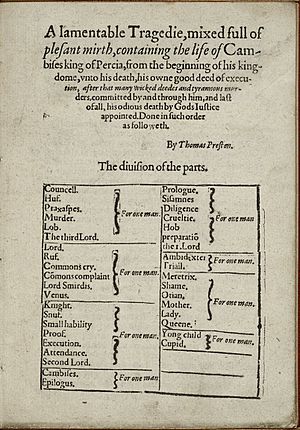Thomas Preston (writer) facts for kids
Quick facts for kids
Thomas Preston
|
|
|---|---|
| Born | 1537 Simpson, Buckinghamshire, England |
| Died | 1 June 1598 Cambridge, Cambridgeshire, England |
| Nationality | English |
Thomas Preston (born 1537, died 1598) was an important English scholar. He was the head of Trinity Hall, Cambridge, a famous college. He might also have been a playwright, writing plays for the stage.
Contents
Thomas Preston's Life Story
Preston was born in Simpson, Buckinghamshire, in 1537. He went to Eton, a well-known school. Later, he studied at King's College, Cambridge. He became a scholar there in 1553 and a fellow in 1556. He earned his first degree in 1557 and a master's degree in 1561.
Meeting Queen Elizabeth I
In August 1564, Queen Elizabeth visited Cambridge. Thomas Preston impressed her a lot. He acted in a play called Dido. He also debated philosophy with another scholar, Thomas Cartwright.
When the Queen left, Preston gave a speech in Latin. The Queen was so pleased that she invited him to kiss her hand. She also gave him money every year and called him "her scholar."
University Career and Later Life
Preston continued his work at the university. In 1565, he became a proctor. This role involved keeping order and managing university affairs. In 1572, he started studying civil law. Four years later, he earned a special law degree called LL.D.
He left his fellowship in 1581. He then joined a group of legal experts called the College of Advocates. In 1584, he became the head, or master, of Trinity Hall. He also served as the vice-chancellor of the university from 1589 to 1590. This was a very important leadership role.
Thomas Preston passed away on June 1, 1598. He was buried in the chapel at Trinity Hall. His wife, Alice, placed a special metal plaque near the altar. It shows him in his university robes and has a Latin message.
Thomas Preston's Writings
Thomas Preston was an early writer for the English stage. He wrote plays and ballads.
The Play Cambyses
In 1569, Preston published a play called A lamentable tragedy mixed ful of pleaſant mirth, conteyning the life of CAMBISES King of PERCIA. This long title describes the story of King Cambyses of Persia. It tells about his good and bad deeds, and his death.
This play was important because it showed a change in English drama. It was a mix of a morality play and a historical play. Morality plays used characters like "Cruelty" or "Small Ability" to teach lessons. Cambyses had these allegorical characters, but also real historical people like King Cambyses.
The play is known for its dramatic and over-the-top language. There is a lot of violence and bloodshed in the story. The language was so grand and exaggerated that it became famous. Even Shakespeare made a joke about it in his play Henry IV, Part 1. He had a character say, "I must speak in passion, and I will do it in King Cambyses' vein." This meant speaking in a very dramatic way.
Who Wrote Cambyses?
Some people have wondered if the Thomas Preston who wrote Cambyses was the same scholar from Cambridge. This is because the play's style is very different from what you might expect from a serious scholar.
However, many experts believe it was indeed the same Thomas Preston. They point out that the play follows the ancient Greek historian Herodotus very closely. It also includes many references to old myths. This suggests the writer was a well-educated person, like a humanist scholar. It's thought that Preston might have used other books, like Johann Carion's Chronica, to help him write the play.
Preston's Ballads
Thomas Preston also wrote popular songs called broadside ballads. These were printed on large sheets of paper.
One ballad was called A Lamentation from Rome how the Pope doth bewayle the Rebelles in England cannot prevayle. It was published in 1570. This song tells a funny story from the point of view of a fly. The fly is inside the Pope's nose when news arrives about a Catholic uprising in England. The ballad describes the Pope getting very angry and throwing furniture around.
Another ballad by Preston, called A Ballad from the Countrie, sent to showe how we should Fast this Lente, still exists and is from 1589. Both of these ballads, and the play Cambyses, have "Quod Thomas Preston" at the end. This means "Thomas Preston wrote this."
A third ballad, which is now lost, was called A geliflower of swete marygolde. It was about the bad effects of tyranny.
Latin Writings
Besides his English works, Preston also wrote in Latin. He wrote speeches for Queen Elizabeth's visit in 1564. He also contributed Latin poems to a university collection in 1560. This collection celebrated the return of the remains of two important scholars, Martin Bucer and Paul Fagius. He also wrote Latin verses for a book by Nicholas Carr in 1571.
 | Bayard Rustin |
 | Jeannette Carter |
 | Jeremiah A. Brown |


